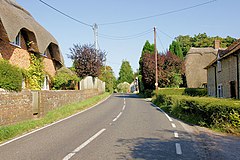Abbotstone
| Itchen Stoke and Ovington | |
|---|---|
 River Itchen, Ovington |
|
 Cottages at Itchen Stoke |
|
| Itchen Stoke and Ovington shown within Hampshire | |
| Population | 373 216 (2011 Census) |
| OS grid reference | SU5594132397 |
| Civil parish |
|
| District | |
| Shire county | |
| Region | |
| Country | England |
| Sovereign state | United Kingdom |
| Post town | ALRESFORD |
| Postcode district | SO24 |
| Dialling code | 01962 |
| Police | Hampshire |
| Fire | Hampshire |
| Ambulance | South Central |
| EU Parliament | South East England |
| UK Parliament | |
Itchen Stoke and Ovington is a civil parish consisting of two adjoining villages in Hampshire, England, 2 miles (3.2 km) west of Alresford town centre in the valley of the River Itchen, 5 miles (8.0 km) north-east of Winchester, and 2 miles (3.2 km) south-east of Itchen Abbas.
The village population is 210, including Abbotstone. Its most notable building is the Church of St Mary, a redundant Anglican church built by the civil engineer and architect Henry Conybeare in 1856, now under the care of the Churches Conservation Trust. It is in an early French style, Grade II* listed and made of brown and grey rubble stone with limestone dressings.
The manor of Itchen Stoke was granted to the Bishop of Winchester by King Edgar in 960. The Domesday Book records the manor as having passed to Romsey Abbey, who retained it until the Dissolution of the Monasteries. It then passed to Sir William Paulet, later the first Marquess of Winchester and stayed with his family until the time of the Commonwealth. Itchen Stoke Mill (with attached miller's cottage) is of ancient origin. The current building dates from the 18th century and straddles the mill race. Itchen Stoke House is 19th century, has nine bays and is central with small grounds; this being the former rectory.
This outlying north-east hamlet of a few houses has a population of 32. It was formerly in its own civil parish and lies along the Ellisfield to Itchen Abbas portion of the Three Castles Path Abbotstone contains an abandoned medieval village, with further details at the charity English Heritage's website and evidence of fortifications, as well as several abandoned quarries.
...
Wikipedia

